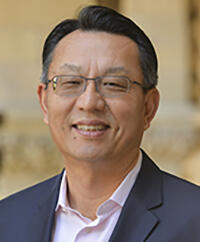U.S.-Korea Relations Under the Trump and Moon Administrations: A Critical Assessment
U.S.-Korea Relations Under the Trump and Moon Administrations: A Critical Assessment
Tuesday, October 27, 20204:00 PM - 5:00 PM (Pacific)
Webinar: Register at https://bit.ly/3j7fIHa
This event is part of Shorenstein APARC's fall webinar series "Shifting Geopolitics and U.S.-Asia Relations."
This panel will review and assess various aspects of the relationship between the United States and South Korea under the leadership of President Donald Trump and President Moon Jae-in. The two leaders appeared able to work together quickly and make some bold moves on issues like North Korea, but the differences between the two have been stark on issues such as military burden sharing and policies toward China. The discussion will also compare the current dynamics of U.S.-ROK relations with that of during the George W. Bush and Roh Moo-hyun period (2003-2008), which is often referred to as the most turbulent yet the most transformative era in the history of the security relationship between the two countries.
Panelists:

Ms. Bicker has been a BBC Correspondent for 20 years. She is currently based in Seoul where she reports on both North and South Korea. She is known for her interviews with President Moon Jae-in and her coverage of the inter-Korean and US-North Korean summits. This year she has produced a number of reports on South Korea’s battle with Covid19 including the documentary "How to Fight Coronavirus." In her previous role as North America Correspondent she followed Donald Trump’s election to the White House and his first years in office, as well as a host of deployments covering a number of issues and breaking news across the United States.

A graduate of Stanford (BA, MA), Ambassador Lippert served as the United States ambassador extraordinary and plenipotentiary to the Republic of Korea from 2014-2017. He previously held positions in the Department of Defense, including as chief of staff to Secretary of Defense Chuck Hagel (2013-2014) and as assistant secretary of defense for Asian and Pacific Security Affairs (2012-2013). Lippert also worked in the White House as chief of staff to the National Security Council in 2009. Lippert served in the uniformed military as an intelligence officer in the United States Navy, he mobilized to active duty from 2009 to 2011 for service with Naval Special Warfare (SEALs) Development Group that included deployments to Afghanistan and other regions. From 2007 to 2008, he deployed as an intelligence officer with Seal Team One to Anbar Province, Iraq in support of Operation Iraqi Freedom.

Minister Yu has 37 years of distinguished service with the Ministry of Foreign Affairs and Trade, including Minister of Foreign Affairs and Trade from 2008 to 2010. Minister Yu started his foreign service in Japan in 1976 as a young diplomat and returned as Ambassador to Japan in 2007. He advised on various political and economic issues concerning both the private and public sector with a view to revamp bilateral relation until his departure from Japan to join President Lee Myung Bak’s administration as a cabinet minister in 2008. He also served as Ambassador to the State of Israel; Ambassador for Anti-Terrorism and Afghanistan Issues; and also Minister of the Permanent Mission to the United Nations in New York. His experience extends across a broad range of issues in the international relations including trade and security issues, and negotiations with North Korea in particular.
Moderator:

Gi-Wook Shin is the William J. Perry Professor of Contemporary Korea; the founding director of the Korea Program; a senior fellow of the Freeman Spogli Institute for International Studies; and a professor of sociology, all at Stanford University. As a historical-comparative and political sociologist, his research has concentrated on social movements, nationalism, development, and international relations.
